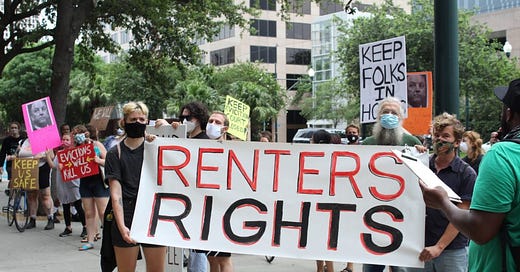New Orleans' Ongoing Eviction Crisis Could Worsen if Moratorium Expires
The national eviction moratorium expires in just over a week
Members of the New Orleans Renter's Rights assembly protest the opening of eviction courts in Louisiana. ReportNOLA photo by Jenn Bentley
A national eviction moratorium protecting renters across the country is set to expire next week - which could result in a steep rise in the number of evictions happening in New Orleans.
Even before the economic crisis caused by the COVID-19 pandemic, New Orleans had an eviction rate nearly double the national average. The eviction moratorium put in place by the federal Coronavirus Aid, Relief, and Economic Security (CARES) Act hasn’t necessarily been helpful, either. According to the Jane Place Neighborhood Sustainability Initiative (JPNSI), 40 percent of evictions observed during their Eviction Court Monitoring Project (which took place before Orleans Parish eviction courts were closed) were forbidden by the CARES Act. Under the Act, evictions from properties participating in the Housing Choice Voucher (Section 8) program, Low-Income Housing Tax Credit properties, public housing, and Permanent Supportive Housing were illegal. The CARES Act also made it illegal to evict a tenant from a property with a federally-backed mortgage, but it’s nearly impossible for tenants to check whether they are protected.
“Due to COVID, I have seen landlords attempt illegal evictions,” said Charles Schully, a New Orleans attorney specializing in tenant defense. “They have even tried to put waivers of the CDC moratorium in their lease and to waive the eviction process in their lease. Even though that may be in a lease, it is illegal and unenforceable, and tenants must be evicted through a legal court proceeding.”
Schully and other tenant advocates across New Orleans fear that without an extension of the moratorium - and without additional renter’s assistance programs - there could be an escalation of the eviction crisis. Tenants could be left with thousands of dollars in back rent due immediately - and landlords may end up defaulting on mortgages if tenants are unable to pay.
“Throughout COVID, the [assistance] programs have been hard to navigate for many, and a lot of people I’ve spoken with have had issues receiving support,” Schully said. He also notes that some landlords seem to prefer the eviction process no matter what.
“The biggest issue I had so far was with landlords who refused to accept aid, which sort of begs the question of if all landlords are really struggling as much as they claim to be.”
In New Orleans, households headed by Black women are most likely to experience eviction, with 56.8 percent of all tenants facing eviction being Black women. Even more concerning, some of the highest rates of eviction in the city occurred in neighborhoods considered to be the most “affordable,” and with the highest COVID-19 infection rates. Most of those who are evicted are given only 24 hours to vacate their homes.
“This is especially troubling considering high rates of COVID-19 infection and mortality amongst Black residents in Orleans Parish,” JPNSI states on their website. “One of the neighborhoods with the highest COVID-19 infection rates is Little Woods, which JPNSI found had an eviction rate of 10.4%. Little Woods’ vulnerability to eviction, as well as its vulnerability to COVID-19, illustrates how systemic racism in the economy, the healthcare system, and the housing market amplifies risk and increases harm within predominantly Black communities.”
Having legal representation is one of the main ways tenants can protect themselves if they’re served an eviction notice. Only 14.6% of tenants who have legal representation are evicted in New Orleans, compared to 65.4% of those without legal representation.
“We need a funded Right to Counsel program for all tenants facing eviction,” Schully says. “Cities with similar demographics - Baltimore, for example - have enacted such programs, and they both reduce unnecessary evictions and actually save money in the process by reducing stress on social services.”
Schully notes that tenants who meet a certain poverty threshold do automatically qualify for legal assistance with Southeast Louisiana Legal Services, but that, “as you can suspect, they have a lot of cases to deal with, and they are underfunded and understaffed.” Those who do not qualify for services should reach out to the Renter’s Rights Assembly, of which Schully is a member.
But most advocates agree that what the city really needs is adequate affordable housing.
“I cannot see the problem being alleviated without a return to fully subsidized public housing,” Schully says. “Mayor Cantrell may benefit personally from public-private partnerships and politically from building partially subsidized units, but they do not help enough tenants. It’s true that the federal government has made it more difficult for local governments to keep up public housing, but the City must adjust to that reality and lobby the Biden administration and HUD to restore a robust public housing program.”




